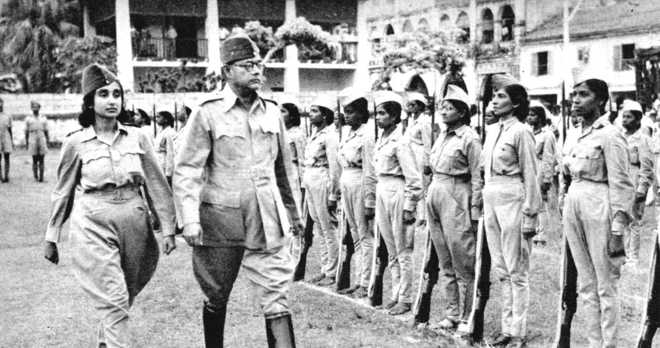D S Cheema
This book is the story of Rani Jhansi Regiment (RJR), the first all-women infantry fighting unit in the military history of India. It was created in Singapore in July 1943 as part of the Indian National Army (INA) by Subhas Chandra Bose to liberate India from British colonial oppression. It also tells the incredible story of an extraordinarily gifted man, popularly called Netaji. German historian Milan Hauner calls him a ‘the tragic hero of Asian nationalism, a Sisyphus-like figure, constantly overtaken by events and destined to lose the struggle.’
History bears testimony to the fact that hundreds of thousands of women from Britain, Germany and America fought during the Second World War. By 1943, army of the Soviet Union had enrolled more than a million fighting women. The 586th Fighter Aviation Regiment, 587th Bomber Aviation Regiment and the 588th Night Bomber Regiment of the Soviet Air Force were all-women units of pilots and aircraft engineers , although these were not formally designated as ‘women’s regiments’. In Indian context the fighting spirit of the legendary Rani of Jhansi remained an inspiration even almost a century later. It is believed that Bose had read an article by an Englishman who wrote after the first war of independence in 1857, “If there had been a thousand women like the Rani, we could never have conquered India”. According to late Captain Lakshmi (Dr Lakshmi Swaminathan) , the Commander of Rani Jhansi Regiment(RJR), Netaji , who had read the article, named the INA regiment of the corps of female combat soldiers Rani of Jhansi as a tribute to the warrior queen. Each of the RJR soldiers of the Indian National Army (INA), roughly five thousand in number, is a case history of grit and determination of women in combat role. Bose emulated his heroes Giuseppe Garibaldi and Eamon de Valera who had won independence for their countries against overwhelming odds. In 1943, one could compare Bose’s quest for freedom with that of Nelson Mandela’s or even with George Washington’s and chances for successful revolution in India looked perfectly reasonable.
The book is a result of a painstaking in-depth research and interviews spanning years. The author, Vera Hildebrand, located and interviewed all 50 surviving Ranis of the regiment which makes this volume a unique and the most authentic compilation of the life and times of Netaji. Her sources included The Oral History Centre at Singapore National Archives, interrogation reports (IRs) of POWs from Interrogation Centre of British Intelligence Service, Private Paper Section of National Archives of India, autobiography of Captain Lakshmi , and available information on the lives of Gen Mohan Singh and Gen Shah Nawaz Khan.
Many historians have criticised quite a few of personality traits of Bose; he was considered arrogant with unreasonable faith in his abilities as a commander since he had no formal combat training, and he had no tolerance for the mistakes of others. His decision of forging an alliance with heinous Nazi regime and tyrants of Japan, which ultimately destroyed him and his movement, is also considered questionable. His plan to push the Japanese-INA advances through Imphal and Kohima on Indo-Burma border failed miserably. However, this doesn’t mean Netaji’s heroic efforts had gone all in vain while struggle by other leaders succeeded.
A few historians believe that the reasons behind Britain’s Labour government’s decision to pull out of India after its costly victory in the Second World War were economic and had little to do with Gandhi’s ‘Quit India’ movement. It is also believed that the British decision to leave India may have been aided by the fact that thousands of its Indian soldiers had joined Bose’s INA, weakening the Indian Army. But the fact remains that Bose was a remarkable man who dedicated his entire life to get freedom to his country and countrymen.
This meticulously researched work gives an entirely fresh perspective to the myth of Bose and his warrior maidens. Every proud Indian has the right to know the compelling truth about Netaji, his wonderful soldiers of the INA and fearless freedom fighters of the RJR. It is indeed intriguing and ironic that such a book had been authored by a non-Indian.
Unlock Exclusive Insights with The Tribune Premium
Take your experience further with Premium access.
Thought-provoking Opinions, Expert Analysis, In-depth Insights and other Member Only Benefits
Already a Member? Sign In Now










